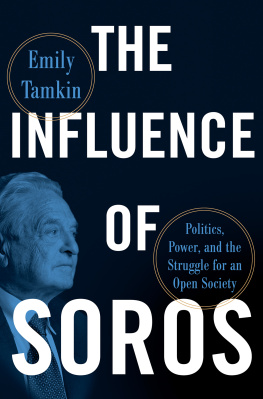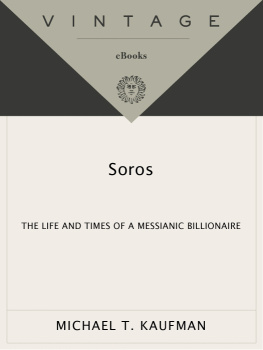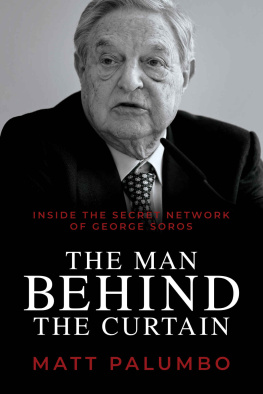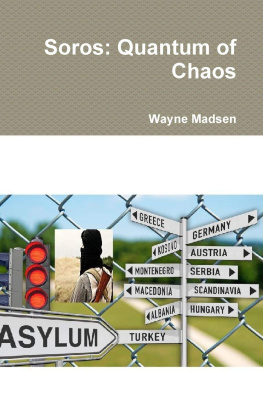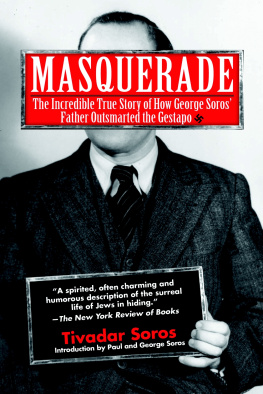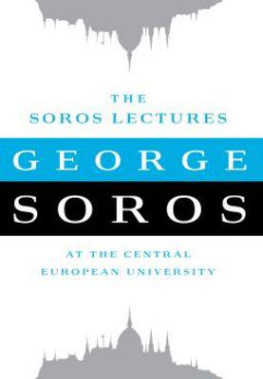Contents
For my parents, and for Neil
Thinking can never quite catch up with reality; reality is always richer than our comprehension. Reality has the power to surprise thinking, and thinking has the power to create reality. But we must remember the unintended consequencesthe outcome always differs from expectations.
George Soros
And it seemed to them that they were within an inch of arriving at a decision, and that then a new, beautiful life would begin. And they both realized that the end was still far, far away, and that the hardest, the most complicated part was only just beginning.
Anton Chekhov
Even when were empowered, it doesnt mean were in control.
Lorene Scafaria
If one believes conspiracy theorists, world leaders, and conspiracy theorists who are world leaders, George Soross influence is everywhere and all-encompassing.
In the past few years alone, Turkish President Recep Tayyip Erdoan has accused Soros of trying to divide and destroy nations;
Trump also suggested that Soros was responsible for a caravan of Central American migrants heading toward the U.S. border, echoing Soross most committed foe: Hungarian Prime Minister Viktor Orbn. Orbn, who was once given a scholarship to Oxford by Soross organization, successfully ran his reelection campaign by maligning Soros and his foundations, accusing him of trying to flood the country with migrants.
It is not only heads of government and state who look to blame Soros for the ills of the world. According to many in the right-wing media, he is remaking America in his own nefarious image. In a broadcast on criminal justice reform, Fox News host Tucker Carlson said Soros is hijacking our democracy.
To those on the political left, although Soros is not the stuff of outright conspiracy theory, he is still sometimes blamed for global ills. In 2015, leftist outlet Jacobin ran an article titled Counting on Billionaires, which argued that Philanthrocapitalists like George Soros want us to believe they can remedy the economic misery that they themselves create.
In this telling, Soros is responsible for the ills of the global financial system and papers over his misdeeds with self-serving charity. While the right obsesses over the idea of Soros as a sort of godfather of the left, some on the actual left call for soaking the rich and argue that every billionaire is a policy failure. On the right, Soros has enemies; on the political far left, he has few friends.
This book is not a biography of George Soros.
A biography of George Soros would include interviews with wives and children, and try to get at the mans most personal and private moments, and attempt to share with the reader a version of the man never seen before.
This book does not do any of that.
This is not a biography of George Soros; rather, this is the story of George Soross influence.
And what is that influence? The rumors, lies, outright conspiracy theories, and sweeping statements about eighty-nine-year-old George Soros are so omnipresent and overwhelming that they threaten to obfuscate the truth, which is that George Soros has wielded and continues to have tremendous influencejust not in the ways that his most famous detractors would have us believe.
It may be an understatement to say that George Soros is influential in finance. Soros, who survived the Nazi occupation of Hungary as a teenager by pretending to be a Christian, went on to study at the London School of Economics and then to work in finance in London and later in New York. He became one of the fathers of the modern-day hedge fund, establishing his own fund, Quantum (advised through the firm retaining his name, Soros Fund Management). He is perhaps the most famous currency speculator in history, credited with (or blamed for, depending on your perspective) breaking the Bank of England by shorting the pound and forcing the United Kingdom out of the European Exchange Rate Mechanism in 1992.
It is also an understatement to say that George Soros is influential in philanthropy. In the late 1970s, concerned that he would die only worrying about money, he began a foundation called Open Society, named after a book by his tutor at the London School of Economics, Karl Popper.
That book, The Open Society and Its Enemies, inspired the idea at the core of Soross philanthropic work. It is a repudiation of Plato, Hegel, Marx, and, most of all, totalitarianism. An open society, according to Popper, is one that promotes freedom, knowledge, progress, and cooperation. It may, in its promotion of individualism and freedom, leave some feeling isolated and anxious, but that, Popper writes, is the price we have to pay for being human.
In addition to paying the price for being human, Soros has spent billions toward the cause$32 billion since 1984.
It is also an understatement to say that George Soros is influential in politics. In 2004, he threw his financial weight behind then-Senator John Kerry in the hope of defeating the incumbent, President George W. Bush, by backing voter mobilization efforts across the country. He saw Bush, with his war in Iraq and response to 9/11, as the greatest threat to open society: Bush, in Soross view, was using military might to impose the idea of American supremacy in a way that was completely counter to the ideals Soros held dear. Despite his best efforts on behalf of the Democratic candidate, Bush was reelected. But Soros is still, to this day, a political backer, primarily for politicians and political causes on the left. In July 2019, he created a PAC for the 2020 election called Democracy PAC and promptly put $5.1 million into it.
Soros may not wield his influence to destroy nations and smuggle in caravans, but he has still done quite a lot.
This book is divided into nine chapters that explore episodes from Soross life in which he was particularly influential. Soros has done so much that there was a seemingly endless selection of events from which to choose and on which to focus. I selected the nine that I thought were the most influential and provided the best material with which to attempt the following three tasks. That judgment was shaped by my previous reporting on Soros, about whom I had written extensively before I ever started this book, by my journalistic work on related subjects like nationalism, populism, and foreign affairs, and by my research background in Russia and Central and Eastern Europe. Still, I will allow that another person could easily look at his life and choose to focus on a completely different set of experiences.
The three tasks are: First, to try to assess what Soross influence in the space of finance, philanthropy, and politics has been.
Second, to disentangle that influence from the conspiracy theories that today threaten to undermine it while examining where these ideas come from and what about Soros in particular is so attractive to illiberal leaders looking for a bogeyman on whom to blame their every problem.
And third, to ask whether the notion of a fairer, freer, more equitable society is not inherently at odds with the existence of a billionaire trying to use his power and influence to make it so. To ask, in other words, whether the idea of open societies can be reconciled with the idea of a man who has given millions upon millions away to make them.
Originally, I had hoped that this book would include a sit-down interview with its subject. But after months of back-and-forth with his (very patient and helpful) communications team and updates of well see what we can do and were trying to see whats possible, I was told that Soros was not doing any interviews. He was willing, however, to answer my questions via email.
My first question was whether he thinks about what his influence has been and, if so, how he would describe or define it.

